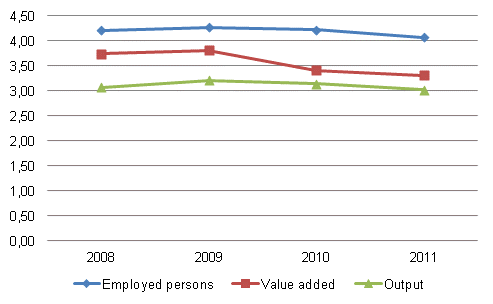Published: 20 November 2013
Culture is a work-dominated economic activity
Culture has conventionally been a very work-dominated activity. The fields of culture made up good four per cent of all employed persons in the whole national economy in 2011. These data derive from Statistics Finland's Culture Satellite Accounts. Thus the employment share of culture is clearly higher than its share of value added or output, which were good three per cent each.
Precentage share of culture in the national economy in 2008 to 2011

Cultural activities have traditionally been regarded as a small-scale activity that balances economic trends. When a downturn hits, its role usually increases slightly because cultural activities include a lot of permanent elements. Fields of culture also involve various voluntary work, which is not, however, visible in the figures of the culture satellite. Cultural activities are often a part-time activity both in good and bad economic times and in many fields of culture the operating surplus (roughly the same as profits for enterprises) is usually quite low.
The employment and production shares of cultural activities increased slightly until the worst recession year 2009. The shares decreased a bit when the national economy made a slight upturn in 2010.
The task of the Culture Satellite Accounts statistics is to depict the economic significance of culture, using the concepts and methods of National Accounts. Data according to the Standard Industrial Classification TOL 2008 have now been released for the years 2008 to 2011. Previously data for 2008 to 2009 have been released, but these data have now been re-calculated to produce uniform time series.
So far, there is no internationally agreed method for producing culture satellite, but the culture satellite compiled in Finland largely utilises the same methods that are used in the so-called Tourism Satellite Account, which have been developed in international co-operation. The compilation method of Culture Satellite Accounts is mostly similar in different countries, but, for instance, the industry selection may vary between different countries, so the results from different countries are not necessarily directly comparable. Culture Satellite Accounts are also called culture satellite.
The data for the Culture Satellite Accounts are published on the statistics website as database tables.
Source: Culture Satellite Accounts, Statistics Finland
Inquiries: Katri Soinne 09 1734 2778, Aku Alanen 09 1734 3320, kansantalous@stat.fi
Director in charge: Leena Storgårds
Publication in pdf-format (214.1 kB)
- Tables
-
Tables in databases
Pick the data you need into tables, view the data as graphs, or download the data for your use.
Appendix tables
Updated 20.11.2013
Statistics:
Culture satellite accounts [e-publication].
ISSN=2323-9905. 2011. Helsinki: Statistics Finland [referred: 19.4.2025].
Access method: http://stat.fi/til/klts/2011/klts_2011_2013-11-20_tie_001_en.html

